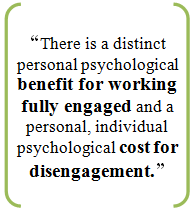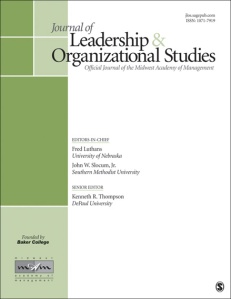Life Is Different For Engaged Employees
Editor’s note: We are pleased to welcome Professor Brad Shuck of the University of Louisville. His paper “Employee Engagement and Well-Being: A Moderation Model and Implications for Practice,” co-authored by Professor Thomas G. Reio Jr. of Florida International University, is forthcoming in the Journal of Leadership & Organizational Studies and now available in OnlineFirst.
 The study of employee engagement is a very personal topic for me. Early in my professional career, I knew this was something I wanted to know more about because I had experienced environments that were less than engaging. These were places of work where I wanted to give, but that ultimately felt constrained and unsafe. Being engaged meant being exposed. What I find as I talk to people about our research is that they have also experienced workplace environments that were less than engaging, or they know someone who has. Moreover, no one tells a positive story about being disengaged in their work, but a lot of people can recall really significant events in their professional lives where they were fully engaged in their work. These events were transformational at times (but not always), and often recalled with positive memories of doing something remarkable and working with others to get there. They were fulfilled and reported experiencing life during those times a little differently. So, ultimately my interest in engagement was to find ways that help employees live better lives in their work; at the core of my research is the belief that employees who experience high levels of engagement in their work also experience life fundamentally differently from those who cannot say they are engaged. I have personally and professionally seen this time and time again, and the research in this field would support that. There is still much more to uncover, but we are making progress.
The study of employee engagement is a very personal topic for me. Early in my professional career, I knew this was something I wanted to know more about because I had experienced environments that were less than engaging. These were places of work where I wanted to give, but that ultimately felt constrained and unsafe. Being engaged meant being exposed. What I find as I talk to people about our research is that they have also experienced workplace environments that were less than engaging, or they know someone who has. Moreover, no one tells a positive story about being disengaged in their work, but a lot of people can recall really significant events in their professional lives where they were fully engaged in their work. These events were transformational at times (but not always), and often recalled with positive memories of doing something remarkable and working with others to get there. They were fulfilled and reported experiencing life during those times a little differently. So, ultimately my interest in engagement was to find ways that help employees live better lives in their work; at the core of my research is the belief that employees who experience high levels of engagement in their work also experience life fundamentally differently from those who cannot say they are engaged. I have personally and professionally seen this time and time again, and the research in this field would support that. There is still much more to uncover, but we are making progress.
 I think many might suspect the important role of workplace climate in the engagement-outcomes question, but the significance of the findings were somewhat surprising. It was surprising to us that the context of work from an individual, personal perspective would have such significant effects across each of the models. We also really wondered whether or not engagement would affect people beyond the traditional areas of performance so often examined. What we found was fairly significant to us – that employees who reported higher levels of engagement were also more likely to report lower levels of emotional exhaustion and depersonalization and higher levels of personal accomplishment with their work, as well as increased levels of psychological wellbeing. This was all in the context of Fredrickson’s Broaden-and-Build Theory. Important to us was that results suggested there was a distinct personal psychological benefit for working fully engaged and a personal, individual psychological cost for being disengaged. I think this has implications for all of us in many areas of our lives.
I think many might suspect the important role of workplace climate in the engagement-outcomes question, but the significance of the findings were somewhat surprising. It was surprising to us that the context of work from an individual, personal perspective would have such significant effects across each of the models. We also really wondered whether or not engagement would affect people beyond the traditional areas of performance so often examined. What we found was fairly significant to us – that employees who reported higher levels of engagement were also more likely to report lower levels of emotional exhaustion and depersonalization and higher levels of personal accomplishment with their work, as well as increased levels of psychological wellbeing. This was all in the context of Fredrickson’s Broaden-and-Build Theory. Important to us was that results suggested there was a distinct personal psychological benefit for working fully engaged and a personal, individual psychological cost for being disengaged. I think this has implications for all of us in many areas of our lives.
The first way we see the extending of future research and practice was the use of non-traditional measures of engagement and psychological wellbeing in this study. The field has been so dominated by just a few voices and this research provides alternate avenues for scholars and practitioners. The dominate voices have so much to offer, but we maintain that advancing research means moving forward and hearing everyone. We knew this was risky in our study, and likely to create some challenge later, but forging new perspectives is rarely an easy task. To be sure, we did not forge these paths, but rather used the scholarship of others who did (and continue to do so) and tried to lift it up. As the old saying goes, a rising tide lifts all boats.
A second area we hoped to influence was to add to the growing conversation about how the experience of engagement effects human beings. We know engagement is good for organizations. This seems clear, but what we do not know much about is the cost or benefit of being engaged from the standpoint of the employee and their well being. We really wondered, “is engagement as good for employees as it is for the organizations they work for?” Hopefully, this paper contributes to that conversation in some small way.
A final area we hoped this study that could influence practice was the training of leaders and those who can influence the psychological climate of the workplace. Clearly, this is a place of development for many. As we mentioned in the article, it seems unlikely and counterintuitive to theory that moments of engagement, which lead to higher levels of employee wellbeing, would develop in negative climates. Thus, a very practical implication of this study concerns the purposeful development of psychologically positive workplace cultures as a means to impact how employees experience and interpret their work. We must work at this and develop very practical solutions that are grounded in sound theory are relevant research.
Read the paper, “Employee Engagement and Well-Being: A Moderation Model and Implications for Practice,” online in the Journal of Leadership & Organizational Studies.
 Brad Shuck is Assistant Professor, Workforce & Human Resource Education at the University of Louisville and a past University Graduate School Fellow at Florida International University. In his role at the University of Louisville, he is engaged in research that examines the emotional and behavioral manifestation of employee engagement and emerging instructional design techniques for adult learners. He has extensive corporate and nonprofit experience with conceptualizing the drivers of engagement, measuring engagement, and designing practical strategies to enhance workplace learning and culture. His work has appeared in publications such as Human Resource Development Review, the International Journal of Small Business, the Journal of Genetic Psychology, the Journal of Management Development, and the Journal of European Industrial Training, among others.
Brad Shuck is Assistant Professor, Workforce & Human Resource Education at the University of Louisville and a past University Graduate School Fellow at Florida International University. In his role at the University of Louisville, he is engaged in research that examines the emotional and behavioral manifestation of employee engagement and emerging instructional design techniques for adult learners. He has extensive corporate and nonprofit experience with conceptualizing the drivers of engagement, measuring engagement, and designing practical strategies to enhance workplace learning and culture. His work has appeared in publications such as Human Resource Development Review, the International Journal of Small Business, the Journal of Genetic Psychology, the Journal of Management Development, and the Journal of European Industrial Training, among others.






















































































